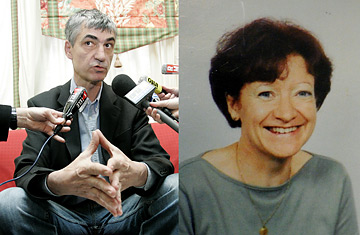
Gilles Antonowicz, lawyer for Chantal Sebire speaks during a press conference in Paris.
Very few people could have looked upon Chantal Sébire at the end of her life and not understood why the former schoolteacher wished to end it. Left horribly disfigured and in frequent torment from incurable tumors that amassed in her sinuses and skull, Sébire's plea that doctors be allowed to legally terminate her life deeply moved French public opinion. It also prompted considerable reexamination of the nation's laws prohibiting active euthanasia —reflection that has continued in the wake of Sébire's March 19 suicide. But the passionate debate Sébire's case sparked may well have unfolded differently had the French public been informed about one neglected aspect: that Sébire had continually refused treatment for her disease for nearly a half decade before it evolved to the terminal phase that resulted in her wanting to die.
Doctors with intimate knowledge of the case tell TIME that though extremely rare, the esthesioneuroblastoma disease Sébire suffered from is now routinely controlled through early detection and surgical removal of the tumors from the nasal vault. Through such operations, specialists say, patients typically go on to lead relatively normal lives. Yet after the disease was diagnosed as the cause of her repeated nose bleeds in 2002, Sébire rejected proposals of surgical intervention — and subsequently turned down the palliative services and pain-masking medication doctors offered. It was only after her tumors had grown too large and present on her brain that Sébire's determination to beat the disease on her own morphed into her final campaign to obtain legally permitted euthanasia from the same doctors whose treatment she'd originally rebuffed. That has caused considerable concern among observers and ethicists who note that neither the media attention directed to Sébire's distressing appeal to die, nor the public sympathy it generated, appeared aware of her own handling of the disease.
"From the moment she refused surgical treatment, growth of the tumors to their ultimate terminal phase was a given," says Jean-Louis Béal, head of the palliative service at the University Hospital Center in Dijon, who repeatedly advised Sébire undergo treatment for the disease and the pain it brought on. Béal says specialists in at least three French hospitals offered Sébire an operation with a relatively good chance of success — upwards of 70% full success in most cases — though they couldn't promise no potential risk of death or incapacity, which Sébire would simply not accept. When she subsequently refused the treatment and medicine he and the other doctors had been recommending, Béal recalls Sébire explaining to him that "drugs are chemicals, chemicals are poison, and I won't make matters worse by poisoning myself." In the end, however, Sébire's stringent views were entirely reversed upon her deciding to die.
"For years she refused the medical community's help to master her disease, and later to limit its evolution and pain," Béal notes. "Then, towards the end, she demanded the medical community help her die using the same sort of medicine she'd rejected as treatment."
Polls taken two weeks before Sébire's suicide (which is being investigated for possible third-party assistance) showed a significant backing for the legalizing of euthanasia for terminal patients. Sébire's public struggle for the right to die doubtlessly played a big part in this figure of 87%. But it's legitimate to wonder whether her appeal would have received such support had reports fully brought to light Sébire's rejection of surgery —or the use of medication to bring on its advance.
"That question of her personal decision in dealing with her disease early on in no way alters her right to a dignified death later in life, argues Emmanuel Debost, a general practitioner who treated and supported Sébire even before her fatal disease was diagnosed. "It also tries to discredit that right to a dignified end by suggesting my patient was somehow guilty in the terminal evolution of her disease."
Physician and leading member of the French National Consultative Committee on Ethics, Axel Kahn, acknowledges there are "several incoherent aspects" to Sébire's attitude towards treatment and demands for an administered death. Still, Kahn isn't sure full disclosure of her case would have changed opinion of her plight. "Public response to her condition and plea for euthanasia was compassionate and emotional," Kahn says. "Hard ethical analysis of whether her own peculiar decisions dealing with her disease undermined her request for death involves rational conclusion. Rarely in our world will the rational win out over the emotional."
